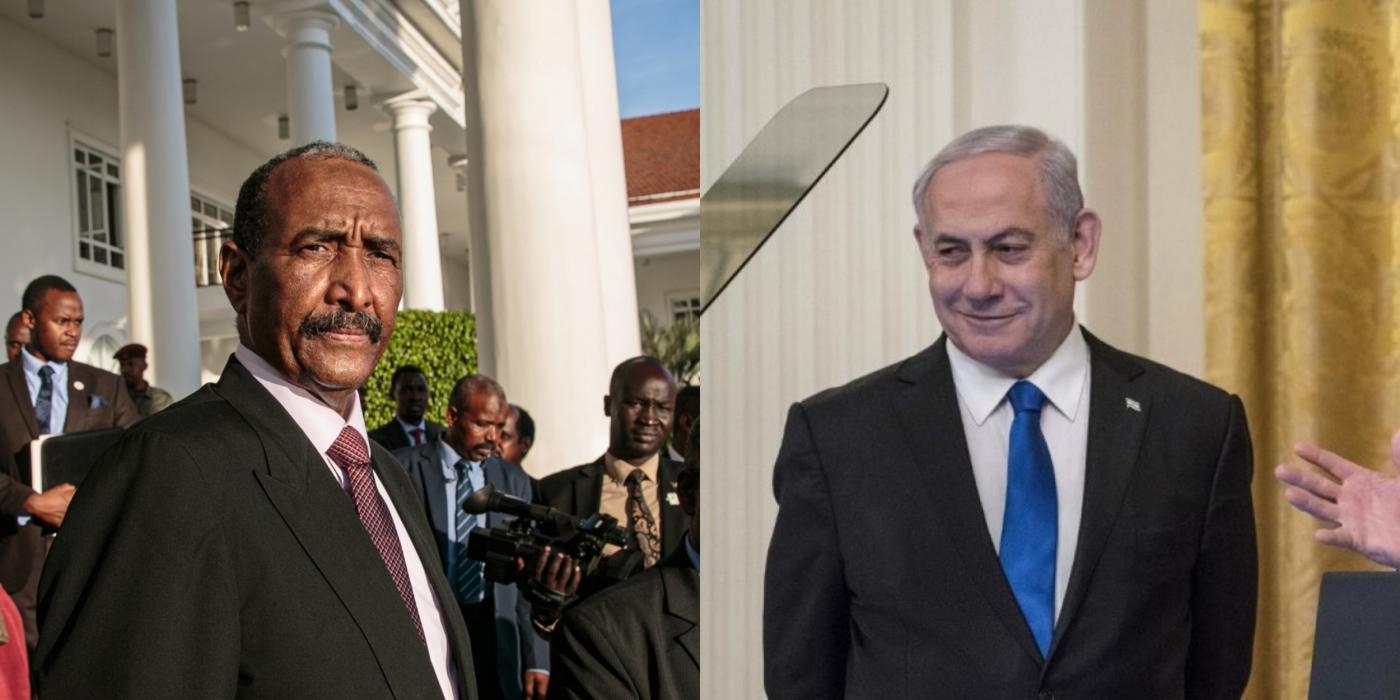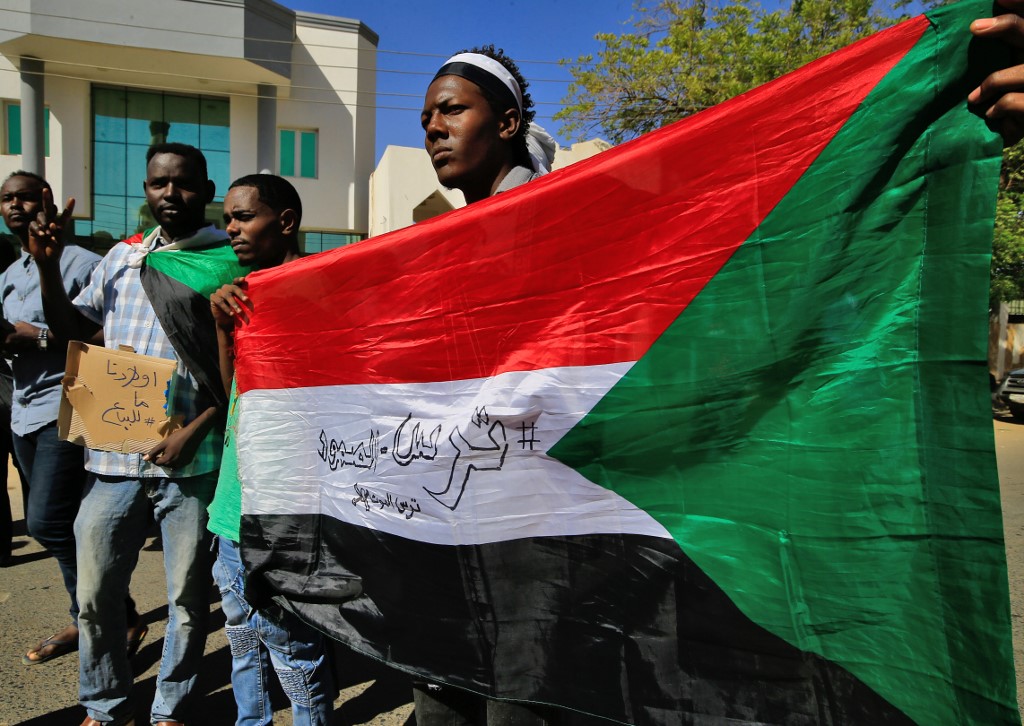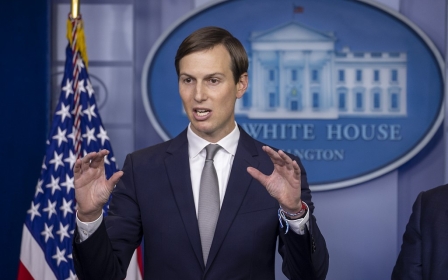Is Sudan backtracking on normalisation with Israel?

The normalisation agreement between Israel and the United Arab Emirates announced last week has raised questions about which countries in the Middle East would follow suit.
Sudan is currently under the spotlight after its government sacked a foreign ministry official who expressed support for the deal and suggested his country is already on a normalisation path.
'What I said reflected the policy of our government in normalisation with Israel, because there are contacts and open political meetings on the top level of the government'
- Haydar Sadig, fired foreign ministry spokesman
The country is currently ruled by an alliance of civilian technocrats and military officials formed in the wake of the April 2019 protests that ousted long-time president Omar al-Bashir.
According to a power-sharing agreement, elections are due to be held 39 months after the deal, signed in August last year.
Whereas a meeting between Sudanese and Israeli leaders last February has deepened the disputes between the civilians and military components of the transitional government, the sacking of the foreign ministry official and the contradiction between various branches of the government has shed light on tensions over the thorny issue of normalisation in Sudan.
New MEE newsletter: Jerusalem Dispatch
Sign up to get the latest insights and analysis on Israel-Palestine, alongside Turkey Unpacked and other MEE newsletters
Contradictory statements
Sudan’s transitional government has issued statements both in support of normalisation and against it within 24 hours, reflecting the lack of a common view on the issue within the Sudanese ruling establishment.
When foreign ministry spokesman Haydar Sadig hailed the UAE-Israel deal in media statements on Tuesday, he was fired the following day.
Sadig called the deal “a brave and bold step”, and noted that Khartoum and Tel Aviv already have secret diplomatic relations.
The foreign ministry said it was "astonished" by Sadig’s comments, and stressed that the government had not discussed the possibility of diplomatic relations.
In a phone call with Middle East Eye on Wednesday, Sadig said he was expressing his “personal views”, but that he stood by his remarks that his country maintains contacts with Israel.
“What I said reflected the policy of our government in normalisation with Israel, because there are contacts and open political meetings on the top level of the government,” the diplomat said.
Israel chimes in
Israel’s intelligence chief Yossi Cohen also contradicted the Sudanese statements, saying his government is in contact with Sudan and that normalisation is “part of the agenda” for their diplomatic relations.
Earlier this year, Israeli Prime Minister Benjamin Netanyahu met with Abdel Fattah al-Burhan, the head of Sudan's ruling council, and reportedly discussed normalisation.
The meeting at the time was viewed by Sudanese analysts as an attempt by Khartoum to get in Washington's good graces and secure the lifting of crippling US sanctions.
The sacking and the contradictory comments by the spokesman and the government have triggered a controversy among the institutions of the transitional government and the political coalition of Forces for Freedom and Change (FFC) that backs it.
A source close to the office of Prime Minister Abdalla Hamdok has also denied any intention of the transitional government to recognise or normalise its ties with Israel.
The source, who asked to remain anonymous because he is not authorised to speak to the press, told MEE that the entire transitional government has agreed to postpone any decision on issues related to ties with Israel until an elected government is in place after the 2022 general elections.
Civilians are split
Activists and citizens in Sudan are also split over the issue of normalisation with Israel. Some believe that it would affect the sovereignty of their country, while others think that Sudan has to serve its interests in this regard.
Ahmed Hussein, a 23-year-old university student, told MEE that the transitional government “has no right” to recognise Israel, and normalisation would be equivalent to relinquishing Sudanese independence and sovereignty.
'We have to look subjectively at the issue of the ties with Israel and understand that we have nothing to do with the issues of Palestine and the Arab League'
- Lubna al-Tahir, activist
On the other hand, Lubna al-Tahir, a 22-year-old activist, told MEE that Sudan is “an African country” and should not be concerned with Arab issues.
“We have to look subjectively at the issue of the ties with Israel and understand that we have nothing to do with the issues of Palestine and the Arab League. We are an African country and have to look at our interests from this perspective,” she said.
Likewise, the FCC coalition, part of the ruling civilian-military government, is divided over the issue.
Arab nationalist parties in Sudan such as National Umma Party (NUP) and the Communist Party have rejected any step towards normalisation, while other members of the FFC have accepted it.
FFC leading member Haidar al-Safi told MEE that normalisation is a national issue that has to be addressed carefully and after wide consultations with the grassroots.
“I think we have to live in peace with all our neighbours, including Israel, but this issue has to be put on the table of the constitutional conference that would be attended by the majority of Sudanese to decide,” he argued.
However, Islamic parties, including the former ruling party, have rejected pro-normalisation rhetoric, warning that they would organise mass protests against it.
A path to lifting Sudan from ‘terror’ list
An Israeli scholar specialising in ties with Sudan, Inbal Ben Yehuda, believes that Khartoum is under pressure from the US, Israel and the UAE to normalise ties with Tel Aviv.
“Sudan certainly seemed to be under the pressure of these three players to advance with normalising relations. The recent agreement between Israel and the UAE can be seen as a boost to Israel’s track with Khartoum,” Ben Yehuda, who works as a research associate at the Forum for Regional Thinking (FORTH) think tank in Jerusalem, told MEE.
She pointed out that the normalisation of ties with Israel can be considered as a path to obtain the removal of Sudan’s name from the list of the countries sponsoring terrorism.
Bashir's old regime has resorted to the same policy to lift the economic embargo on Sudan, she said.
“In the past decade, we have witnessed Bashir and some of his staff reach out to Israel as a way to get through to the US government in order to lift the sanctions over Sudan. This trend continues now with the objective of removing Sudan from state sponsors of terrorism list,” she stated.
Meanwhile, a former US diplomat believes that Khartoum is trying to get closer to the US through Emirati and Israeli channels.
“I think Sudan recognises that the UAE is widely celebrated in Washington for making peace with Israel and will benefit in its political and economic ties to the Trump administration as a result,” Cameron Hudson, a former chief of staff at the office of the US envoy to Sudan told MEE.
“Khartoum must recognise, as it gets closer to negotiating a better relationship with Washington and being removed from the terrorism list, that an improved relationship with Israel would only help its chances.”
A trial balloon
Hudson, who is also a senior fellow at the Atlantic Council, has attributed Khartoum's backtracking to a conflict between the civilian and military components of the transitional government.
“I see this as a disconnect between the military and civilian wings of the transitional government. If we look at the first outreach by the Israelis, even though it was described as a diplomatic move, the discussions seemed to be happening through security channels between the two governments.
'The backtracking today by the foreign ministry appears to be an attempt by the civilian leaders to retake control of this file'
- Cameron Hudson, former US Sudan diplomat
"The backtracking today by the foreign ministry appears to be an attempt by the civilian leaders to retake control of this file. It is not unlike in February, when both the foreign minister and the prime minister declared that they were not aware of the meeting between Burhan and Netanyahu before it took place."
But Yehuda says that Khartoum may be trying to use a trial balloon to gauge internal and regional reactions.
“The recent denial by Khartoum of any current intentions to pursue normalisation is indeed confusing," she said.
"The true nature of Khartoum’s real intentions with regards to Israel is unclear to the public. In this sense, much like with other current burning issues in Sudan right now, the people face lack of transparency and are left with all too many questions towards the transitional leaders regarding the future of Sudan."
Middle East Eye delivers independent and unrivalled coverage and analysis of the Middle East, North Africa and beyond. To learn more about republishing this content and the associated fees, please fill out this form. More about MEE can be found here.







